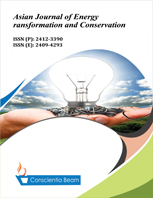Non-Renewable Energy Consumption and Environmental Pollution in Nigeria
DOI:
https://doi.org/10.18488/journal.81.2020.41.22.29Abstract
This study examined the effect of nonrenewable energy use, output, domestic credit and FDI on environmental pollution in Nigeria through the use of ARDL method from 1980 – 2016. The outcome of the study’s estimation reveals that all the variables possess the long run association. It is indicated that in short and long run conditions, nonrenewable energy use, FDI and trade increased environmental dilapidation, thereby adversely affect environmental quality in Nigeria. However, financial development has negative influence on environmental degradation. The finding clearly illustrates that nonrenewable energy utilization rise environmental pollution in Nigeria. Hence, policymakers should design appropriate policies to enhance environmental quality through policies that will regulate the use nonrenewable energy and backed the policies in promoting the utilization of renewable energy resources, inform of wind, solar and hydro energy. It is essential for government to take anti-corruption measures, that the designed policies are implemented appropriately to achieve the benefits of the policies. This would be very vital in achieving environmental quality, welfare enhancement, poverty reduction as well as sustainable economic development.

